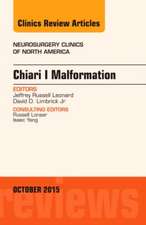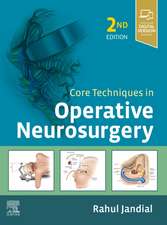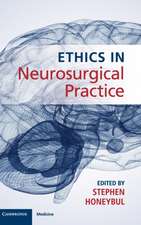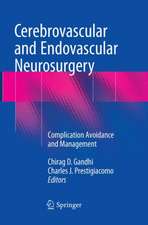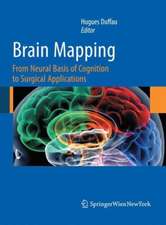Traumatic Brain Injury: Science, Practice, Evidence and Ethics
Editat de Stephen Honeybul, Angelos G. Koliasen Limba Engleză Paperback – 18 sep 2022
The book is divided into four sections: the first section covers the epidemiology of TBI, the changing global patterns of presentation, and the basic pathophysiology and classification, while the second discusses contemporary management of TBI, from pre-hospital care, emergency assessment, and medical and surgical management to rehabilitation and social reintegration. The third section then examines the evidence gained from recent clinical trials that have investigated the efficacy of management strategies involving intracranial pressure monitoring, multimodal monitoring, hypothermia, erythropoietin, thromboembolic prophylaxis and decompressive craniectomy. Lastly, the fourth section explores the ethical issues, both at the societal level and on an individual basis.
Written by a broad range of experts, this book provides a valuable reference resource for neurosurgeons, intensivists, clinicians with ethical experience and pure bioethicists in their daily work.
| Toate formatele și edițiile | Preț | Express |
|---|---|---|
| Paperback (1) | 787.94 lei 6-8 săpt. | |
| Springer International Publishing – 18 sep 2022 | 787.94 lei 6-8 săpt. | |
| Hardback (1) | 1115.86 lei 3-5 săpt. | |
| Springer International Publishing – 18 sep 2021 | 1115.86 lei 3-5 săpt. |
Preț: 787.94 lei
Preț vechi: 829.42 lei
-5% Nou
Puncte Express: 1182
Preț estimativ în valută:
150.79€ • 155.78$ • 125.50£
150.79€ • 155.78$ • 125.50£
Carte tipărită la comandă
Livrare economică 25 martie-08 aprilie
Preluare comenzi: 021 569.72.76
Specificații
ISBN-13: 9783030780777
ISBN-10: 3030780775
Pagini: 355
Ilustrații: XIII, 355 p. 76 illus., 29 illus. in color.
Dimensiuni: 178 x 254 mm
Greutate: 0.64 kg
Ediția:1st ed. 2021
Editura: Springer International Publishing
Colecția Springer
Locul publicării:Cham, Switzerland
ISBN-10: 3030780775
Pagini: 355
Ilustrații: XIII, 355 p. 76 illus., 29 illus. in color.
Dimensiuni: 178 x 254 mm
Greutate: 0.64 kg
Ediția:1st ed. 2021
Editura: Springer International Publishing
Colecția Springer
Locul publicării:Cham, Switzerland
Cuprins
I Scientific background.- 1 Epidemiology of traumatic brain injury (Including prevention strategies.- 2 Pathophysiology of traumatic brain injury.- 3 “Mechanics of brain tissue damage following trauma”.- 4 Neuroprotection in traumatic brain injury.- II Current clinical Practice.- 5 Prehospital and emergency department management.- 6 Monitoring the injured brain.- 7 Contemporary Medical management of traumatic brain injury: High income countries.- 8 Contemporary Surgical management of traumatic brain injury: High income countries.- 9 Contemporary management of traumatic brain injury: Low and middle income countries.- 10 Military management of traumatic brain injury.- 11 Rehabilitation and social reintegration following traumatic brain injury.- III Evidence.- 12 Predicting outcome following traumatic brain injury.- 13 Biomarkers in traumatic brain injury.- 14 Erythropoietin in the management of traumatic brain injury: Current evidence.- 15 Progesterone in the management of traumatic brain injury: Current evidence.- 16 Amantadine in the management of traumatic brain injury for Traumatic brain injury.- 17 Hypothermia in the management of traumatic brain injury: Current evidence.- 18 Decompressive craniectomy in the management of traumatic brain injury: Current evidence.- 19 Cranioplasty following traumatic brain injury.- 20 Thromboembolic prophylaxis.- 21 Comparative effectiveness research.- 22 Brain Death: Current evidence and guidelines.- 23 Introduction to ethical concepts.- 24 Ethical issues when making clinical decisions in paediatrics patients.- 25 Long term outcome following traumatic brain injury: ethical issues.- 26 Withholding and withdrawing care.- 27 Prolonged disorders of consciousness.
Notă biografică
Stephen Honeybul is a Consultant Neurosurgeon with a subspecialty interest in neurovascular surgery and a research interest in clinical outcomes and ethics. Currently he is the state-wide Director of Neurosurgery in Western Australia and a Consultant Neurosurgeon at Sir Charles Gairdner Hospital, Royal Perth Hospital and Fiona Stanley Hospital. A fellow of the Royal College of Surgeons of England and Australasia, past member of the Neurosurgical Board of Australia and currently an examiner for the final neurosurgical fellowship examination, he is also the current chair of the WFNS ethics and law committee.
Angelos Kolias is a Consultant Neurosurgeon and Senior Clinical Lecturer at the Department of Clinical Neurosciences, Addenbrooke’s Hospital and the University of Cambridge, Cambridge, UK. His interests include neurotrauma, neuroendoscopy, anterior skull base/pituitary surgery and spine surgery. He is also interested in the methodology of clinical neurosurgical research (particularly trials) and global neurosurgery. He is the Co-Chief Investigator of four NIHR-funded randomised trials in the field of neurotrauma and the Associate Director of the NIHR Global Health Research Group on Neurotrauma.
Angelos Kolias is a Consultant Neurosurgeon and Senior Clinical Lecturer at the Department of Clinical Neurosciences, Addenbrooke’s Hospital and the University of Cambridge, Cambridge, UK. His interests include neurotrauma, neuroendoscopy, anterior skull base/pituitary surgery and spine surgery. He is also interested in the methodology of clinical neurosurgical research (particularly trials) and global neurosurgery. He is the Co-Chief Investigator of four NIHR-funded randomised trials in the field of neurotrauma and the Associate Director of the NIHR Global Health Research Group on Neurotrauma.
Textul de pe ultima copertă
This book provides a comprehensive analysis of the contemporary management of all aspects of traumatic brain injury (TBI), combining the findings of several recent randomised controlled trials investigating the role of hypothermia, erythropoietin, intracranial pressure monitoring and decompressive craniectomy in the management of TBI.
The book is divided into four sections: the first section covers the epidemiology of TBI, the changing global patterns of presentation, and the basic pathophysiology and classification, while the second discusses contemporary management of TBI, from pre-hospital care, emergency assessment, and medical and surgical management to rehabilitation and social reintegration. The third section then examines the evidence gained from recent clinical trials that have investigated the efficacy of management strategies involving intracranial pressure monitoring, multimodal monitoring, hypothermia, erythropoietin, thromboembolic prophylaxis and decompressive craniectomy. Lastly, the fourth section explores the ethical issues, both at the societal level and on an individual basis.
Written by a broad range of experts, this book provides a valuable reference resource for neurosurgeons, intensivists, clinicians with ethical experience and pure bioethicists in their daily work.
Written by a broad range of experts, this book provides a valuable reference resource for neurosurgeons, intensivists, clinicians with ethical experience and pure bioethicists in their daily work.
Caracteristici
Presents an ethical analysis of the evidence currently available in the management of TBI Includes a detailed analysis of the societal impact of TBI Covers a range of ethical issues such as prognostication, consent, withdrawing and withholding care, survival with severe neurocognitive disability and adaptation to severe disability




